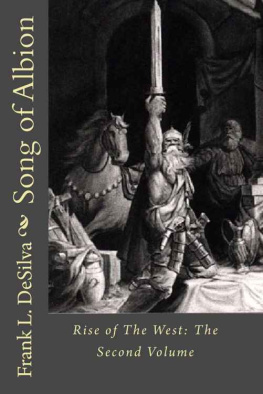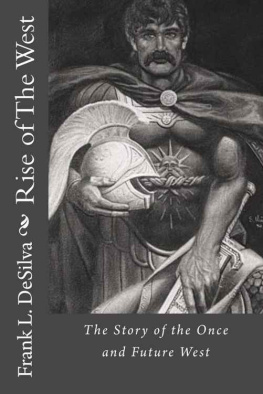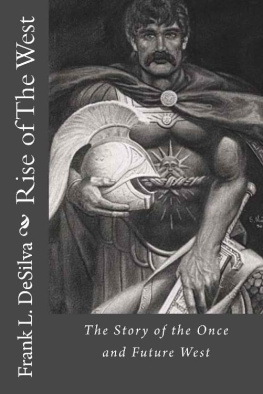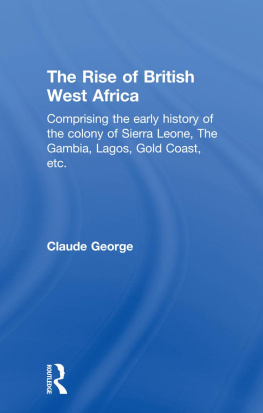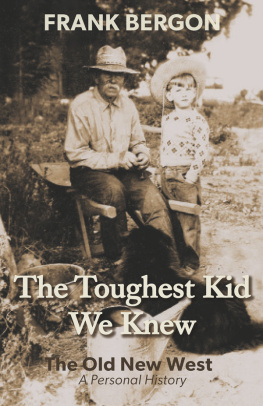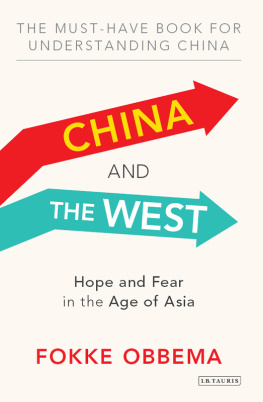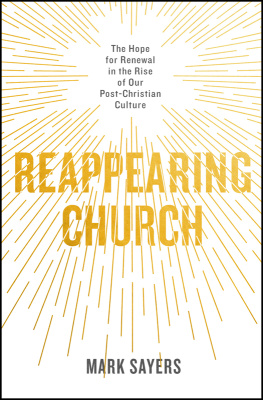Frank L. DeSilva - Rise of The West
Here you can read online Frank L. DeSilva - Rise of The West full text of the book (entire story) in english for free. Download pdf and epub, get meaning, cover and reviews about this ebook. year: 2014, genre: Science. Description of the work, (preface) as well as reviews are available. Best literature library LitArk.com created for fans of good reading and offers a wide selection of genres:
Romance novel
Science fiction
Adventure
Detective
Science
History
Home and family
Prose
Art
Politics
Computer
Non-fiction
Religion
Business
Children
Humor
Choose a favorite category and find really read worthwhile books. Enjoy immersion in the world of imagination, feel the emotions of the characters or learn something new for yourself, make an fascinating discovery.
- Book:Rise of The West
- Author:
- Genre:
- Year:2014
- Rating:5 / 5
- Favourites:Add to favourites
- Your mark:
- 100
- 1
- 2
- 3
- 4
- 5
Rise of The West: summary, description and annotation
We offer to read an annotation, description, summary or preface (depends on what the author of the book "Rise of The West" wrote himself). If you haven't found the necessary information about the book — write in the comments, we will try to find it.
The organic and lineal continuum of Western ethnic Culture.Being The Second Volume of the Culture, History, Aspirations, and Destiny of the People of the West, To whom I dedicate this Work in the Hope that through it, in some small Way, Might provide the necessary impetus in which They may, in turn, utilize for the Hope and future Survival Of our great and future People.
Rise of The West — read online for free the complete book (whole text) full work
Below is the text of the book, divided by pages. System saving the place of the last page read, allows you to conveniently read the book "Rise of The West" online for free, without having to search again every time where you left off. Put a bookmark, and you can go to the page where you finished reading at any time.
Font size:
Interval:
Bookmark:
By:
Frank L. DeSilva
Second Volume
BeingThe SecondVolume of the Culture,History, Aspirations, andDestiny of the People of the West,To whom I dedicate this Work in theHope that through it, in some small Way,Might provide the necessary impetus in whichThey may, in turn, utilize for the Hope and futureSurvivalOf our great and future People.
Dedicated to the Future of White Children2008Acknowledgments
To Randall Paul Evans (who has endured as much as anyone), RichardGirnt Butler, Robert E. Miles, David Lane, Revilo P. Oliver, WilliamPierce, Thomas Metzger, and all those unnamed individuals with whom Ihave had contact in both peace and warespecially you three; you knowwho you are.
To Sherryl, who lived a more Christlike life than most I have ever met, andgave pride to the name of Matriarch: and to Robert who, as a Father andHusband, stands taller than most; I will miss our conversations, Sissleepwell.
And finally, to all those decent, sincere common-folk, who have sharedconversations, coffee, their world-views, their hopes and dreams, theirfears and silence, their love of family, god, and of their own children, whomake all the sacrifices worthwhile.
And lastly, to that man against timeFrank L. DeSilva
To Bob
Ten hearts, one beatOne hundred hearts, one beat
Ten thousand hearts, one beat iv
The American Gulag, built to house those who, for one reason or another,subverted the law and intent of the existing order. Every Nation requires aplace to house those who would subvert the law of the land, both in thepresent and, most importantly, in the future.
In the Summer of Nineteen Ninety, I was imprisoned at the FederalPenitentiary, Butner, North Carolina, my third in succession to thispoint. This housing was in direct consequence to the prison riot ofNineteen Eighty-nine, at the Federal Penitentiary in Arizona1, dueto prison staffs dereliction of duty in denying medical attention toone, John Chaffey, suffering from a brain aneurism, which was thecause of death.
1 I wanted to add a small mention as to this particular place:
From the first drop-off spot, after being delivered by plane to Lompoc, Ca., I was soonthereafter sent to Phoenix, Az., or simply phoenix to its many denizens, where I was tospend approximately four and a half years; the Warden there was one Peter Carlson who, Iwas to learn, kept a very clean ship, was an extremely fair man, intelligent, compassionateto both wives and children of his charges and, for me at least, represented an exemplarystudy in how civil servants should be gauged.
The prison riot which was simply a general reaction to a tragic event, could not havebeen stopped, short of giving immediate aid to the individual who needed it, but a warden issubject to many intrigues, personal agendas by staff and the like, and was simply a party toan event which transcended any one individual. It is my understanding that Mr. Carlsonwas slotted to become the Bureau of Prisons Director within a few years but, sadly, wasreplaced by a Clintonian affirmative action placement, Janet Reno, which did nothing formorale throughout the system, nor did it provide a better environment for staff nationwide.
Moreover, I suspect that Peter Carlson might well be embarrassed by his mention in thispresent work, however, it would be remiss of me to not mention a worthy and professionalhuman character who, as one mucked through the dungeons of this nation, stood tall as abeacon of reason and professional discipline, as well as a moral compass (for many), thatmight have benefited his entire profession if allowed to achieve a higher status, based onmerit, not on political cronyism. FLS
My stay at the american gulag, Butner, was done not so much toovertly punish me, but to keep me quiet regarding the death ofMr. Chaffey. I was asked to sign a paper which, among otherthings, absolved prison staff of wrong doing; I refused to sign, andwas willing to aid the Chaffey family in whatever venue theyfound themselves.
Butner, a true american gulag, housed John Hinckley, theattempted assassin of President Ronald Regan, the only sittingpresident I ever voted for. Butner, a prison where narcotics, of thepsychotropic variety, were used liberally on prisoners/patients forany number of reasons; although, to my knowledge, none wereever used on my person.
It was a trying time, and the move from Arizona was stressful, notonly because I was in an unfamiliar environment, but because ithad placed me so far from my family. Nevertheless, that is how themodern american gulag system likes to operate; stress, andinstitutional perversity, does much in the way of destabilizing onesspirit. It can conquer you, or you can conquer it, there is no halfway point.
Life, itself, is like this.I was sentenced to Forty Years in the Federal gulag system forHarboring a Fugitive, and transportation of stolen money, underthe RICO act, a system of law designed to thwart the ItalianCrime syndicates, a direct threat to Robert and John Kennedy who,like the Mafia, demanded control of their respective armies. Onewould use bullets, and the other words, to dismantle or defeat theiropponents. Men, real men, fight their opponents based on conflictof interests, on territory, or faith; both sides know there are rules,parameters, and levels by which he is to conquer. RICO, as a tool,knows no boundaries or parameters when, using federal law, itseeks to conquer an opponent.
Such was my first and only run-in with the modern american gulagsystem.I had met many diverse individuals, of every Race and Creed, upto this point, and it had been quite a learning experience. Whenfaced with isolation from friends and family, and seeing ones lifetaken from them for periods longer than the human mind can
viitranslate into discernible fragments, individuals create independentresources and values which, with time, become their salvation ortheir damnation. Within this context, each Racial group seeks itsown tribe by which each individual, and as a group, may insulateitself from the dangers and threats it perceives will destroyhim/them. This is Natures Law. Not the law of the jungle, butNatures divine plan for the extension of each particular specie. Itseeks no absolution for its hardness; it seeks no redemption for itsright to determine the destiny of its subjects. Nature can be a cruelMistress, or she can be understood in the ways in which she,herself, is quantifiable; in which she serves the gods who madeher. This american gulag, then, becomes the Crucible by whichnature is compacted, formed, and presents the individual withtruths and consequences, which are rarely addressed in civilizedlife. Yet, all the elements and conditions, which the gulag presentsis, as is natural, are present, also, in our daily living; it is presenttoday, as you read this work.
I am a White Nationalist, a euphemism which will, hopefully,make its meaning clear as this present work progresses.I did not evolve, or devolve into this dynamic in the gulags of thisnation but, rather, entered the world at my birth, as a member ofthe Western race-culture; a seed, left as a legacy to Life. Like myFather and Mother before me, the elements of race and legacywere also presentand so, as before, and before that. This is thecorporeal beginning of unity, both of purpose as well as function. Itis the extension of both the family which is the State and theessence of who that family is, and will ever be. What is thatessence?
Aristotle, a man of Western stock declares2:2Politics - By Aristotle, Book I, Part I.viii
Race, that element which we are all a part of. Race, that presencewhich defines us, molds us, and continues after we are gone. Race,that which separates us; marks us as unique, one to the other. Race,the element of
Font size:
Interval:
Bookmark:
Similar books «Rise of The West»
Look at similar books to Rise of The West. We have selected literature similar in name and meaning in the hope of providing readers with more options to find new, interesting, not yet read works.
Discussion, reviews of the book Rise of The West and just readers' own opinions. Leave your comments, write what you think about the work, its meaning or the main characters. Specify what exactly you liked and what you didn't like, and why you think so.

